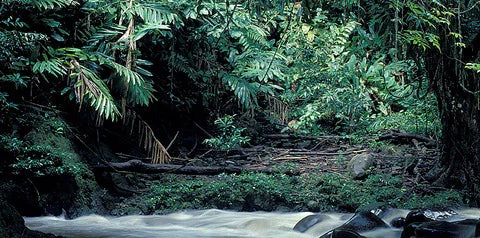Read this post in Français
Here at the World Bank we believe that independent internal evaluation is central to strengthening our work. Rigorous, evidence-based evaluation informs the design of global programs and enhances the development impact of partner and country efforts.
The World Bank Group’s Independent Evaluation Group (IEG) has undertaken a review of the implementation of the 2002 Forest Strategy. The strategy emphasized the positive developmental benefits of forest conservation and management, while strengthening environmental and social safeguards.
The report confirms that the World Bank’s forest work has:
- contributed substantially to positive environmental outcomes;
- successfully reduced deforestation when forest protected areas are designed and managed by people who live in and around them;
- improved livelihoods, especially through support for participatory forest management initiatives, which involve and empower local communities;
- advanced the rule of law in a sector plagued by patronage, corruption, and rent-seeking by increasing transparency and accountability and by putting environmental standards in place.
But to be most useful, an evaluation must meet a quality standard.
While we agree with some of IEG’s findings, we – and our Board - strongly disagree with others. The review of the World Bank Group’s work on forests is too often based on generalizations about the forest sector and thus falls short of presenting a comprehensive evaluation of the World Bank’s actual work in this critical area.
As a result, the report misses the complexity of working in this challenging sector, and neglects to recognize the Bank’s success in forest management.
The World Bank does not finance industrial-scale logging. We work with countries to manage their forests more sustainably.
In fact, the World Bank is working to stop destruction of tropical forests by combating weak governance and corruption that has plagued the forest sector for decades. The bulk of our portfolio supports communities and their rights to benefit from forests. We see our role as improving forest governance and fighting corruption so that local people can benefit most.
In the Democratic Republic of Congo, where we have worked with the Government since 2003 to cancel around 25 million hectares of illegal logging concessions, transparency has improved dramatically. This has created the space for indigenous peoples and local communities to manage their forests more sustainably.
Our work on establishing extensive new areas of planted forests in China has increased average annual per capita income by 150 percent among participating communities.
Working with governments, civil society and the private sector, the Bank has catalyzed the transfer of use and access rights for large wooded areas from states to communities. In Tanzania, Bank support for legal reforms created over 3 million hectares of village forest reserves and in Brazil, 24 million hectares of tropical rainforest are now under protection because of this work.
So let me be clear, we are in this sector, will stay in the sector, and remain committed to this work – even more so given the challenge of climate change. Forests provide income, solace and meaning for people and help the planet breathe.
The World Bank is committed to supporting countries in their efforts to harness the potential of forests to reduce poverty, better integrate forestry into their economies, and protect and strengthen the environmental role forests play, locally and globally.
For more on The World Bank Group’s forest work, click here.
The views of the Bank’s Committee on Development Effectiveness (CODE) on the report are available here. The management response to the report is available here.
Rachel Kyte
Vice President for Sustainable Development
www.worldbank.org/sustainabledevelopment
Twitter: @rkyte365



Join the Conversation